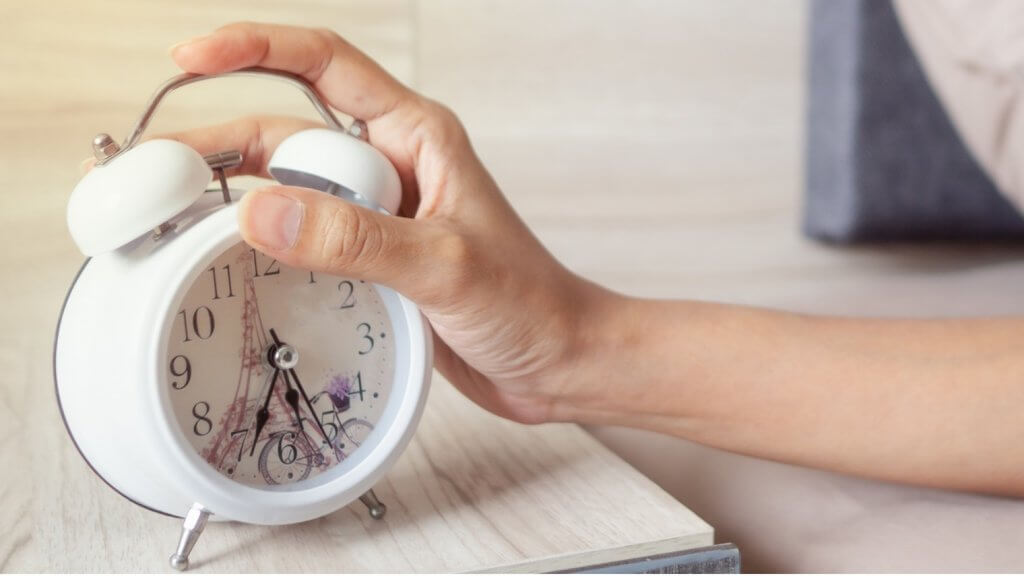Inside: Incorporate some of these habits to improve mental health to boost your happiness and overall well-being.
Life can get pretty stressful.
Between work, family, friends, and all kinds of other obligations and commitments, it can be hard to find time to prioritize your own well-being.
We often have a lot going on – and many times, we feel like there isn’t too much we can actually DO about it.
But there is something you can do – a few things, actually.
While you may be able to cut back on some obligations, others may not be optional, but you can embrace some habits to improve mental health.
Good habits for mental health can make stress more manageable, help you stay positive, and legitimately benefit your physical health – and that’s just the beginning.
All you need to do is put a little effort into the process of building positive habits to improve mental health, and you’ll reap the rewards for years to come.

Why Are Good Mental Health Habits So Important?
Many of us already have some healthy habits in place that support our physical health.
If you brush your teeth every morning and night, shower regularly, or take a multivitamin on a daily basis, congratulations – you’ve already built a few healthy habits for yourself.
But many of those fundamental habits we’ve been leaning on since childhood focus on our physical health – not our mental well-being.
It’s a good thing it’s never too late to learn a new habit!
Developing some habits to improve mental health is important for a few reasons.
Your mental health impacts virtually everything you do – whether or not you realize it. When you’re stressed out, anxious, or overwhelmed, it takes a toll on your physical well-being as well as your emotional health.
And it doesn’t just impact you. Chances are high that your friends, family, acquaintances – even your pets – can pick up on that negative energy.
Beyond that, healthy mental health habits can help you rest better at night and start each day on a positive note. They can help you better handle the situations you encounter throughout your day and think more clearly. And they can improve your energy and your ability to focus.
The best part?
The best habits for mental health can bring all of these benefits – and then some – are things you can start today, for free, to keep your mind healthy and happy.

10 of the Best Habits to Improve Mental Health
Ready to incorporate a few healthy mental health habits into your routine? I’ve got you covered. These habits are effective, simple, and cost nothing more than a few minutes of your time and energy each day.
1. Practice Gratitude
Cultivating gratitude on a regular basis is one of the most impactful habits you can use to enrich your life. Many of us move through the day on autopilot, not stopping to recognize all of the blessings that surround us.
Practicing gratitude will improve your life in various ways and there’s data to back that up.
Quite a few studies have been conducted on the topic of gratitude and how it can legitimately benefit your health and well-being – as this article from Harvard Health Publishing describes.
When you intentionally focus your mind on positive things, it has a big impact on how you think and feel.
You can start small by simply writing down three things each day that you’re grateful for. You’ll quickly see how gratitude can be considered a healthy mental health habit.
Want more ideas on how to begin? Try these gratitude prompts or start by simply writing down some of the simple joys you notice in your own life.

2. Exercise Often
Disclosure: As an Amazon Associate I earn from qualifying purchases. Please note that I only recommend products I use and love. Click here to read my full disclosure policy.
Exercise doesn’t just benefit your physical fitness. Working out can also bring a number of benefits to your mental well-being. Exercise has been proven to reduce anxiety, boost self-esteem, curb depression, and enhance your overall cognition – and more.
However, exercise is easier said than done for many of us – especially when you’re starting from zero and developing this habit from scratch. But if you can make exercise a regular part of your life, you’ll enjoy the physical and mental benefits for years to come.
The biggest key to making exercise a habit is to find something you truly love to do. Are there any sports you enjoy, like tennis, soccer, or softball?
Or are there exercise classes that interest you such as a spin class, dancing, or yoga? Or perhaps you prefer to be out in nature and would rather hike or walk. It doesn’t really matter what form of movement it is as long as it’s something you look forward to doing.
Recently, I purchased a walking treadmill to help me get more steps in regardless of the weather outside. I use it with a standing desk and it’s definitely encouraging me to exercise more!
Making a habit out of an exercise you dread can be virtually impossible, but by making it a positive experience, you’ll find yourself more open to – or even excited by – the idea of your next workout.
Meeting up with a friend can be another great way to increase your likelihood of showing up.

3. Choose Healthy Foods
Whether we’re aware of them or not, we all have habits when it comes to what we choose to eat.
If you’re in the habit of eating fruits and veggies, cooking at home, and eating appropriate portions – congratulations. You’re helping more than your physical health. You’re also doing your mental health a favor!
A bad diet can bring you down in a big way. After all, food is fuel. Put good fuel in the tank, and everything runs smoothly. Put in bad fuel, and you’ll leave yourself tired, hungry, and not feeling great.
Embrace healthy eating habits, and you might be surprised to find yourself thinking more clearly, making better decisions, and feeling more positive overall.
You don’t have to cut out every treat that you enjoy, but limiting them will have a big impact on your physical and mental health. It does take time and discipline but making a habit of choosing healthy food habits can have a profound effect on your life.

4. Keep a Journal
Writing down your thoughts and feelings can definitely be considered a healthy mental health habit.
Our minds can get so filled with thoughts that they can legitimately feel cluttered. We often have a lot of thoughts bouncing around at any given time.
It can be difficult to process, think, and make good decisions when we’re dealing with so much – even if it’s really just background noise.
By embracing a journaling habit, you can get those thoughts out of your mind and onto paper.
There’s a certain kind of clarity that comes from physically capturing thoughts and ideas. Journaling can help you solve problems, navigate trauma, reflect on situations you handled well – or poorly – and more.
While you don’t need a topic to get started if you’d prefer a little guidance, you can find all kinds of journaling prompts and tips here.

5. Get Enough Sleep
While sleep is more of a biological function than a habit, the way you approach bedtime, make sleep a priority, and set yourself up for a restful night is a habit.
Like many other things, poor sleep can lead to many negative impacts on your mental health.
Not getting enough sleep leaves you tired and groggy, impatient, and unable to think as clearly as you should. It can lead to impaired decision-making, poor attitudes, and all kinds of other outcomes that manifest in a negative way.
On the other hand, good sleep can make you feel great – physically and mentally.
To sleep better, create an evening routine with healthy habits.
By winding down the same way each night and working toward the same bedtime, you’ll train your body to prepare for sleep at that particular point in the evening. Your inner clock will sync up with your actions, and you’ll find it much easier to fall into a restful sleep – and stay that way until it’s time to wake up.
Rest benefits your mind and your body and is a key part of having good mental health habits.

6. Create Boundaries with Technology
In recent years more studies have become available to inform us of some of the negative impacts that social media and too much technology are having on people.
While not all technology is bad, it is important to establish boundaries to have healthier relationships as well as improve your mental health.
One of the best habits for mental health is being intentional with social media use. That means being thoughtful about who you follow as well as when and how you use your phone.
There are good things that can come from being online, but it’s important to be aware of how technology may be influencing you or distracting you. It takes constant self-monitoring to ensure that you’re using your device in a way that is beneficial rather than detrimental.
It’s wise to take regular technology breaks and periodically evaluate your boundaries and time limits. Not only will this help you to regain control of your time, but it will also help you to better manage your mental health.

7. Go Outside
There are many benefits to be experienced from going outdoors. Being in nature and getting fresh air is an excellent mental health habit.
As people continue to spend more and more time indoors, it’s taken a toll on their physical and mental health.
Consider ways that you could get spend a bit more time outside. From taking a walk, to eating on the patio, to exploring a local nature trail, anytime spent in nature will be beneficial for your health.
Getting outside is a helpful way to take a break from the typical distractions you’d experience with technology and the various things vying for your attention.
Instead, you can focus on listening to birds singing, the feel of the wind blowing, and the smells of flowers blooming. Nature has the power to heal and if you’ve been feeling disconnected or overwhelmed, getting outside is a great way to recenter yourself.

8. Build a Support System
Life can feel lonely at times. One way to build more resilience in your life is by creating your own support system.
The people in your support system could be family, friends, or a combination of both. Choose people that you trust and who you know have your best interests at heart.
In the process of building a support system, you may also want to take a look at the current relationships in your life and decide whether or not you need to do any relationship decluttering.
As you build your support system, it’s also helpful to look for ways to get involved in your local community and get to know people that live near you.
Serving in your community is not only beneficial for your mental health because it feels good to do good for others, but it can also be a way to develop more relationships.
Having social support is something many people have lacked in recent years. It does take intentionality and effort to form friendships.
Interactions can feel awkward at first. That’s perfectly normal. It’s part of the process. Be willing to be vulnerable and say hello to neighbors.
Everyone needs people they can call when they need help. And it’s really nice when you can easily ask your neighbor for a cup of sugar because you’ve built a relationship.
Including a therapist that you like and trust can also be a helpful part of developing your support network. Having a professional that you can connect with when needed is an important part of supporting your mental health.

9. Make Time for Yourself
Another important one of the habits to improve mental health is making time to take care of yourself. If you’re someone who is a caretaker of others, this can be difficult to do especially during certain seasons of life.
However, making self-care a regular part of your to-do list is not only a positive mental health habit, but it can also allow you to refuel so that you can continue with your current obligations without burning out.
There is a saying that if you don’t pick a day to relax, your body will pick it for you. It’s crucial to ensure that you’re setting aside some time for things that feed your soul. This can have a big impact on your overall health and well-being.
Evaluate your current commitments and see if there are ways you can declutter your schedule. Freeing up time as you’re able can help you to have a more balanced life.
Overcommitting is a surefire way to add more stress to your life. If you tend to be a people pleaser who says yes too quickly, make the habit of not deciding right away.
Giving yourself a bit of time and space to consider whether or not you have the bandwidth (or desire to commit) is a way to practice self-care and protect your mental health.

10. Declutter the Excess
Not surprisingly the last one of the habits to improve mental health and boost happiness that I’m going to mention is decluttering.
Clutter can have various negative effects on your life. From increasing anxiety to experiencing frustration in your home, excess stuff can prevent you from being able to fully enjoy or completely relax in your space.
If you’re overwhelmed with the things in your home, start decluttering it.
Focus on one very small area at a time. This will make decluttering feel more doable and will keep your home from becoming a bigger mess.
Reclaiming your space and letting go of the stuff and the burdens that come along with it can go a long way in improving your mental health.
Which of the best habits for mental health do you want to add to your life? Leave a comment and let me know!
Sign up on the form below to get weekly tips on living simply and intentionally sent straight to your inbox. You’ll also get the free Habit Tracker Worksheet to help you build new positive habits in your life.


Nice and realistic post. Thank you for these simple and doable tips.
Number 9.
Hi. Everyone.
Hi. Juliana .. Congratulations for this such stunning theme of article .
I simply simplify that I simply love your Simplicity habit .
Hope you guys are stretching out and expanding the best health and habit. My favorite one is SPEND TIME IN NATURE….even so I haven’t walked out so frequently. I wish …I need and want.
Even so I choose This one I feel comfortable to practice all of other ones. Please, allow me suggest one which is somehow already included in each topics – it is MEDITATION..
Just close your eyes and be back or just be in essence of prenatal and stages of sleeping.
I myself just sit down on my comfortable chair,close my eyes and feel more myself and the Universe which is outside and inside me.
Once again.
My Infinite Gratitude for your time and love.
I have decluttered my house, since retiring. The house looks beautiful and I feel better about myself! Thank you for the enlightenment!
This article enlightened me on the reasons I’ve been so depressed and full of anxiety. The tips are wonderful! Ty so much for sharing.
Big one-Declutter!
Almost as big-sleep, I never get enough sleep!
Ty
I do some of these already, but the only thing I really need to do is declutter my environment.
Thanks for spreading positivity 💖